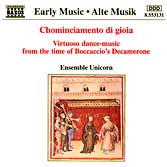 |







|
 |
In Giovanni Boccaccio´s novel collection Il Decamerone
(1353) we hear the story of ten young florentine
noblewomen and noblemen withdrawing the horrors of
pest for ten days to a country-seat in order to delight in
art by singing, dancing and recounting stories. In the
Decamerone there are numerous hints to the musical
habits of the time "...came to her and having somedele
comforted her with kindly speech, softly played her a fit
or two on a viol he had with him and after sang her
sundry songs..." One of the first manuscripts containing
purely artistic resp. dance-music comes from Northern
Italy and is kept in the British Library in London. Apart
from several madrigals whose language and notation
would date the copy to c. 1390 there are 15 monophonic
instrumental pieces at the end of the manuscript. They
all are shaped as dance-music of the time. Moreover, the
explicit naming of the kind of dance - istanpitta, saltarello
and trotto - suggests the steps involved (stamping,
hopping, trotting). Long extemporary paraphrases of the
melodic lines and frequent leaps by a fifth or a fourth are
quite in accordance with the then instrumental musical
habits which were coined by Arabic culture; they lie well
under the hand regarding instruments of the time (fiddle,
recorder, harpe ud, bagpipes) Its the first time in music
history that titles are supplied which nearly seems
programmatical: Belicha (the war-like lady), Parlamento
(talk), Tre Fontane (three springs), In Pro (please),
Ghaetta (the cheerful lady), Principio di virtú (principle of
virtue), Chominciamento di gioia (beginning of joy) and Isabella.
|
 |
PRODUCER:
Michael Posch
ARRANGEMENTS:
Ensemble UNICORN director: Michael Posch
RECORDING DATES:
W*A*R Studio Wien;
11. - 13.9.1991
SOUND ENGINEERS:
W*A*R Studio; Elisabeth and Wolfgang Reithofer
MUSIC NOTES:
Riccardo Delfino
|
 |